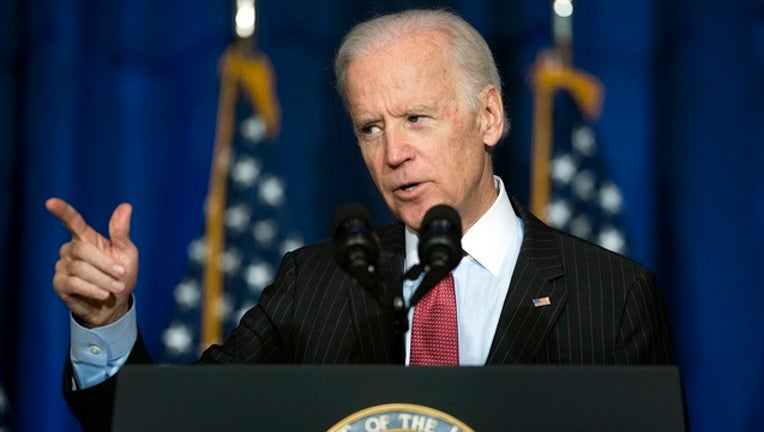Biden cancer nonprofit suspends operations indefinitely

Former Vice President Joe Biden (DoD News photo by EJ Hersom)
WASHINGTON (AP) - A nonprofit foundation set up by Democratic presidential candidate Joe Biden that relied on health care world partnerships to speed a cure for cancer has suspended its operations, it announced Monday.
The Biden Cancer Initiative's sudden move to cease its activities comes two years after it was founded in 2017 by the former vice president and his wife, Jill, as a philanthropic extension of Biden's stewardship of the White House Cancer Moonshot program. Biden, who on Monday was detailing his health care plan , headed the Obama administration effort to accelerate a cancer cure in tribute to his son Beau, who died of the disease in 2015.
The nonprofit promoted nearly 60 partnerships with drug companies, health care firms, charities and other organizations that pledged more than $400 million to improve cancer treatment.
Biden and his wife left the group's board in April as an ethics precaution before he joined the presidential campaign . But the nonprofit had trouble maintaining momentum without their involvement. And the roles played by Biden allies and health care-related firms in aiding the foundation's activities have raised questions about their potential interests if Biden won the presidency.
RELATED: Joe Biden promises to 'cure cancer' if elected president
"Today, we are suspending activities given our unique circumstances. We remain personally committed to the cause, but at this time will have to pause efforts," said Greg Simon, the nonprofit's executive director.
Simon, who had a similar executive role in the Cancer Moonshot government anti-cancer effort, did not elaborate on the reasons the foundation was shutting down its operations. But a nonprofit staffer who spoke on the condition of anonymity to discuss internal decision-making said that the foundation had struggled to operate at the same pace after the Bidens' departures.
The Biden Cancer Initiative has taken in several million dollars in direct funding for its operations, but the bulk of the money supporting the partnerships it promotes comes in the form of indirect pledges. That money does not go directly to the nonprofit but instead is managed by the participating companies and organizations to fund their research and work. Biden's group has used its platform and Biden's appearances to promote the partnerships.
Last September, at the nonprofit's first summit convened in Washington, Biden trumpeted 57 commitments by pharmaceutical firms, other health care companies and organizations. Most were newly pledged by the organizations, though at least a dozen were carry-overs from Biden's government-run Cancer Moonshot work.
But in the 10 months since, the nonprofit has announced only a handful of new commitments, a sign that without the Bidens' involvement the foundation was unable to operate on its own.
As Biden immersed himself in the presidential campaign, the nonprofit also became a potential target for political attacks because of its close work with corporations and political allies whose interests posed potential ethics concerns if he returned to the White House.
READ MORE POLITICAL NEWS:
- Trump moves to end asylum protections for most Central American migrants at US-Mexico border
- President Trump's tweets against liberal congresswomen called racist
- Beto O'Rourke says he and wife Amy are descendants of slave owners
- President Trump tells liberal Democratic women to leave the U.S.
- Pence acknowledges 'tough stuff' at border detention centers
An Associated Press examination of the nonprofit's partnership program and Biden's speeches on behalf its activities found last month that in some cases health care world entities and allies touted by the former vice president were already lobbying for interests before the federal government.
In January 2018, Biden spoke at a San Francisco conference sponsored by a health tech firm whose chief medical officer is Biden's son-in-law, who was also on the Biden cancer nonprofit's board. During that speech, Biden also hailed a medical device entrepreneur who has helped raise funds for Biden's campaign. Both firms lobby with the federal government. Similarly, the Biden nonprofit promotes commitments from at least a dozen major drug firms that lobby with the government.
As a response to the AP report, Biden's campaign said that if he won the presidency he would issue an executive order and staff guidance on the hiring of lobbyists and other ethics concerns. The campaign did not provide details on that planning. Biden's campaign also said his nonprofit's operations would not be incorporated into a Biden administration cancer-fighting effort. That could have meant that the nonprofit would have continued working with health care industry organizations with Biden in the White House.
Biden commits to "the highest standards of ethical culture," deputy campaign manager Kate Bedingfield said last month.
She added that Biden believes that success in curing cancer "will only be achieved by calling on the resources and creativity of a robust private-public partnership: government, health care nonprofits, innovative medical startups, hospitals, pharmaceutical companies and patient advocacy groups."
The Bidens' cancer foundation was the second nonprofit tied to a major Democratic presidential candidate that has halted operations this year. In March, the Sanders Institute , an issue-oriented foundation founded by the wife and son of Vermont Sen. Bernie Sanders, said it would end activities amid criticism that the nonprofit had blurred lines between family, fundraising and campaigning.
The Vermont-based institute said it would stop accepting donations and suspend all operations by the end of May "so there could not even be an appearance of impropriety," Jane Sanders said.
The Associated Press contributed to this report.

